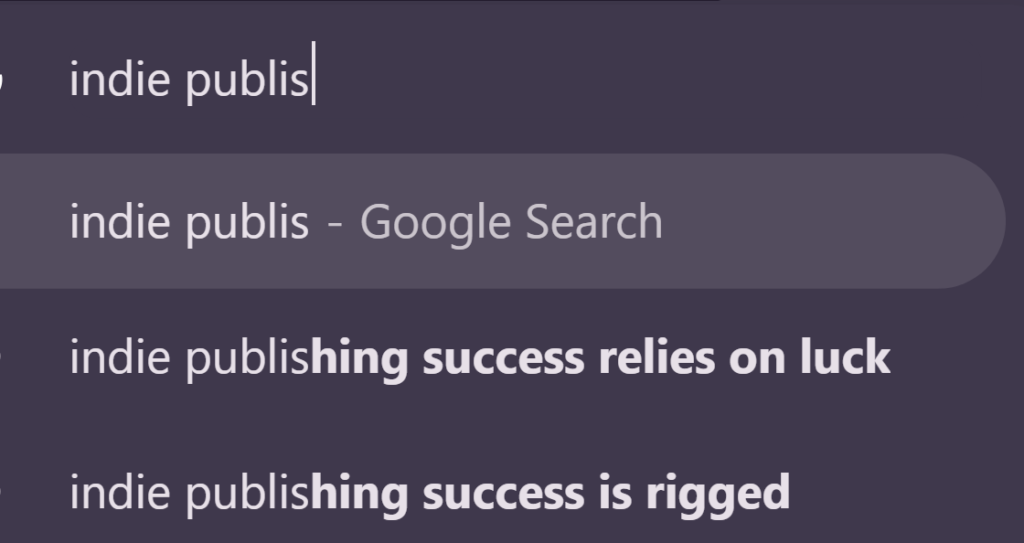
One of the more interesting things about searching anything on Google is the auto-complete function.
When you start typing in the phrase you want to search, Google suggests variations of what it thinks you might be searching on, so that you can just click on the full phrase, instead of finishing typing it.
Google picks its best guess as to what you might be intending to search by choosing among the most popular searches that start with what you have so far typed.
It’s interesting, because you get to see what other people are searching, possibly closely related to what you want to know.
The other day, I started typing in “indie publishing”. Honestly, I can’t remember what the rest of my search phrase was going to be, because I was gob-smacked by the phrases that Google came up with as suggested completions.
The image, above, is a screenshot of the search I was going to make. You can see I got as far as “indie publis” before halting in amazement.
The two most popular searches that start with “indie publishing” are:
Indie publishing success relies on luck
and
Indie publishing success is rigged.
That means that a lot of people are asking Google if indie publishing is a con.
Wow.
No, You Don’t Have to Be Lucky To be a Successful Indie Author
I speak from experience.
I’ve never hit a traditional best seller list (NYT, USAT). I didn’t luck into a story that went viral, or just happened to have a major influencer fall in love with my writer and tell everyone to buy my books. I’ve been #1 on Amazon for about three hours, once. My books and my career have never “broken” big.
But I’ve steadily built up a backlist catalogue, and multiple streams of writing revenue that makes me enough sales to let me write full time.
No luck required.
Some authors do jag the break of a lifetime. Absolutely. And these are the cinderalla stories that the media loves to write about, which leaves the less-informed author with the impression that lucky breaks are the only way to get ahead.
That’s flat-out not true. You don’t have to get the lucky break in order to succeed.
On the other hand, if you want to be traditionally published, you will need a big pile of luck, or the relentlessness of an ice age. There are no guarantees in traditional publishing.
While, with indie publishing, hard, smart work will net you success, if you count success as decent sales and a regular pay cheque.
No, Indie Publishing Is Categorically NOT Rigged!
There are no shortcuts in indie publishing.
You cannot pay someone to get ahead faster.
To establish yourself as an indie author takes time and a very sharp learning curve. It used to be that you had to have at least three books published before you started seeing reliable sales. Then, as the industry matured, you needed to have a full series out. Then, it was suggested that twenty books, minimum, would earn you a decent salary–and a whole Facebook author group, 20 Books to 50K was built around this idea.
These days, it could be far more than 20 books before you notice any traction with readers. There are a lot of factors that affect this number, including how quickly your writing improves, how well you market, what genre you’re writing in and if that genre is popular and if you can hit the tropes and meet reader expectation, or if you’re writing in a niche that is so new, you’re carving readers out of the woodwork with your thumbnails.
If you write across more than one sub-genre, or write more than one series at a time, the number also increases. And so on.
And these days, you must market. In some way, shape or form, you must get word out about your books to readers who have never heard of you before, as well as letting readers who like your books know that you have new novels out. The ways in which you can do that are infinite.
You will probably work harder on your indie business than you’ve ever worked on anything else in your life.
There are no shortcuts.
But I read about that writer who paid for his New York Times Bestseller
Oh, there are scams out there, along with grey-hat strategies and tactics that take advantage of the way the industry runs.
Every time Amazon changes the rules about how to publish on their platform, it is most likely because they’re trying to cut off schemers and lazy get-rich-quick a-holes who figure out a fast way to make a buck.
And yes, there are companies out there who, for the right amount of money (more than I have, I assure you), will arrange for your newly released book to hit all the bestseller lists that week.
But these guaranteed best-seller services are not unique to indie publishing. In fact, most of them serve the traditionally-published non-fiction market, where the author isn’t interested in writing, but in having a business card that sucks up clients. A best-selling book does that for them.
All the schemes and grey-hat tactics designed to tear away money from the indie publishing industry are also thought up by people who are not interested in writing careers, but in getting rich in whatever way works fast.
Authors who indie publish, who want to earn a living writing fiction, which they love doing, are not trying to rip off the system. They do not have a magic password. They have not been ushered into an inner sactum of successful indie authors where they are given the big secret and the keys to the kingdom.
They’ve worked their dogs off and they’ve earned their success.
You can, too.

Write More, Faster Than Ever Before | Are You Prolific?
Editing Your Next Novel? Mark Posey offers fast, writer-friendly edits with zero drama. Check out services »
